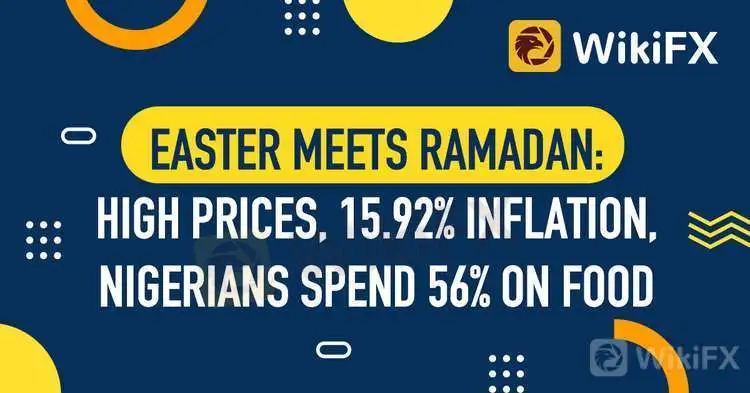简体中文
繁體中文
English
Pусский
日本語
ภาษาไทย
Tiếng Việt
Bahasa Indonesia
Español
हिन्दी
Filippiiniläinen
Français
Deutsch
Português
Türkçe
한국어
العربية
EASTER MEETS RAMADAN: HIGH PRICES, 15.92% INFLATION, NIGERIANS SPEND 56% ON FOOD
Abstract:The global rise in food prices is weighing on emerging and developing economies, and Nigerians are now spending more than 56% of their total income on food, as food inflation in the country approaches 18% after printing 17.20% year on year in March 2022, according to current National Bureau of Statistics (NBS) figures.

The global rise in food prices is weighing on emerging and developing economies, and Nigerians are now spending more than 56% of their total income on food, as food inflation in the country approaches 18% after printing 17.20% year on year in March 2022, according to current National Bureau of Statistics (NBS) figures.
Between 2020 and 2022, average commodity prices in Nigeria increased by about 127%, reflecting the reality on the ground, with consumers remaining strained, pinched, and beleaguered at a time when official inflation is at 15.92%, climbing for the third consecutive month in 2022. Nigerians' purchasing power continues to be undermined by the naira's ongoing depreciation, a pressure that is unrelenting, with the indigenous currency presently selling at around N600 to the dollar on the parallel market.
The ongoing conflict between Ukraine and Russia, which is now registering in the nation, is putting pressure on local commodities prices.
It is an election year, and analysts have predicted that election spending will fuel inflationary pressures and squeeze the pockets of ordinary Nigerians. While inflation figures may gradually rise or fall, consumer goods prices will continue to see demand and cost pull inflation in the face of current realities in Nigeria.
According to analysts at Financial Derivatives Company Limited, “it is disheartening that five of Nigeria's seven biggest import partners are battling with growing inflation while critical import commodity prices have risen dramatically.” Food contributes to 20% of consumer spending in developing markets, up to 40% in Sub-Saharan Africa, and 56% in Nigeria. Food price increases have aggravated existing macroeconomic challenges in several emerging nations, which are dealing with high debt levels, currency constraints, and inflation.
According to Afrinvest Research and Consulting, “food inflation jumped 25 basis points to 1.9% month on month in February due to continued insecurity concerns in rural areas and the impact of [the] Russian-Ukraine situation on wheat and corn prices.” Similarly, core inflation increased by 8 basis points to 1.3% month on month as PMS shortages pushed up costs. We expect these variables to continue impacting price trajectory in March, and as a result, we forecast that headline inflation will climb to 15.73% year on year. It outperformed this posting by 15.92%.
Following the blues of December 2021, which brought the annual inflation average to 17% with the headline inflation index changing direction to 15.4% year on year following the decelerations recorded in the previous 8 months, 2022 began with an upward trend in the numbers and, for the third consecutive month, the headline inflation in Nigeria printed at 15.92% year on year in March 2022 due to price increase expectations in the month ahead of Ramadan.
According to the NBS inflation data, food inflation in March was highest in Kogi at 22.21%, followed by Cross River at 19.86% and Kwara at 19.53%, while Sokoto had the slowest rise in year-on-year food inflation at 14.04%, followed by Kaduna and Rivers at 14.66% and 14.81%, respectively.
Pressures from the upcoming elections are already expected to result in higher inflation numbers, and with the economy grappling with unemployment, low revenue, insecurity, a weak naira, slow output growth challenges, global inflation, supply disruptions, and climate shocks, the average Nigerian will still be in pole position to experience the looming effect, which is likely to place Nigerians in their millions back into poverty if fiscal and monetary policymakers do nothing.

Disclaimer:
The views in this article only represent the author's personal views, and do not constitute investment advice on this platform. This platform does not guarantee the accuracy, completeness and timeliness of the information in the article, and will not be liable for any loss caused by the use of or reliance on the information in the article.
Related broker
Read more

The Impact of Interest Rate Decisions on the Forex Market
Interest rate changes determine currency attractiveness, influencing capital flows and exchange rate trends. Understanding this mechanism helps investors navigate the forex market effectively.

How a Housewife Lost RM288,235 in a Facebook Investment Scam
A 47-year-old housewife in Malaysia recently fell victim to an online investment scam, losing a substantial sum of RM288,235 after engaging with a fraudulent scheme advertised on Facebook.

A Trader’s Worst Mistake: Overlooking Broker Reviews Could Cost You Everything
In today’s digital age, reviews influence nearly every decision we make. When purchasing a smartphone, television, or home appliance, we pore over customer feedback and expert opinions to ensure we’re making the right choice. So why is it that, when it comes to choosing an online broker where real money and financial security are at stake many traders neglect the crucial step of reading reviews?

Interactive Brokers Launches Forecast Contracts in Canada for Market Predictions
Interactive Brokers introduces Forecast Contracts in Canada, enabling investors to trade on economic, political, and climate outcomes. Manage risk with ease.
WikiFX Broker
Latest News
The Withdrawal Trap: How Scam Brokers Lure Victims into Paying More
FCA to Investors: Think Twice Before Trusting These Brokers
Trump\s tariffs: How could they affect the UK and your money
Trump gambles it all on global tariffs he\s wanted for decades
TradingView Brings Live Market Charts to Telegram Users with New Mini App
Trump tariffs: How will India navigate a world on the brink of a trade war?
Interactive Brokers Launches Forecast Contracts in Canada for Market Predictions
Authorities Alert: MAS Impersonation Scam Hits Singapore
IG Group Acquires Freetrade for £160M to Expand UK Investment Market
U.S. March ISM Manufacturing PMI Released
Currency Calculator







